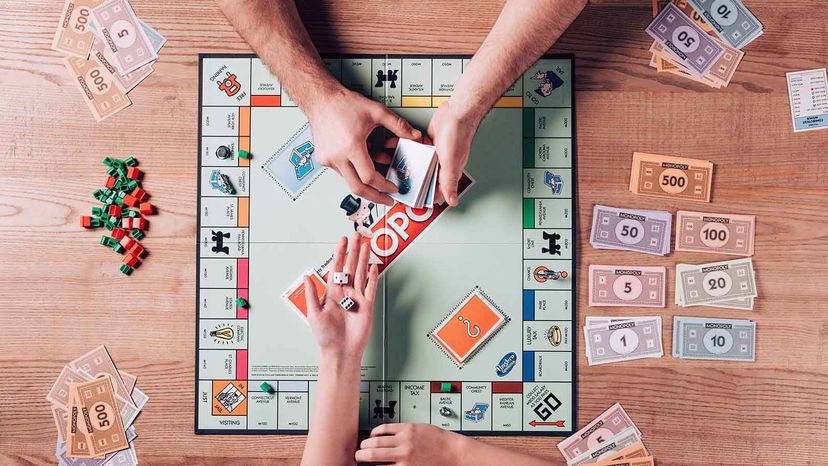
Whether you're new to the game, or you're an amateur real estate mogul with a reputation for obliterating your opponents, the Monopoly board game can get really complicated really quickly. Consider that Monopoly is known for having "house rules" — rules that players can create to alter the official gameplay — and it's easy to see why some players, no matter how experienced, need to brush up on the Monopoly rules from time to time.
So before you try to Pass Go and Collect $200, let's take a look at the official Monopoly rules and see if you discover any surprising differences from the way you learned to play.
Before you can even start play, you must set up your Monopoly game.
The Monopoly Banker
The Monopoly Banker handles the bank's money, pays salaries and collects income taxes. SamJonah/Shutterstock
The Banker can play the game, but they also must keep their personal funds separate from the bank cash.
What does the Monopoly Bank hold and distribute?
The Bank pays salaries, collects income tax, and conducts all transactions between players and the game.
How to Play Monopoly
Now that you know the basic rules of Monopoly, it's time to play. Don't forget, the object of the game is to create a monopoly and become the wealthiest player by buying, renting and selling the properties on the board. This will, ultimately, force the other players into bankruptcy.
To start play, let every player, starting with the Banker, roll the dice. The player with the highest roll goes first.
Every player puts their tokens on the corner spot marked "Go," then they throw the dice in the order they will play and move the number of spaces indicated by their roll. Then follow these steps:
Buying and Selling Property in Monopoly
Create a monopoly by buying up all the properties of a single color so you can start charging double rent. Erin Cadigan/Shutterstock
During your turn, you might land on unimproved property that's for sale, including railroads. You can buy unowned property from the Bank. You'll get the Title Deed cards proving you own it. Then you can do any of the following on that property:
Once you own property, you charge rent to other players who land on your property, according to the printed price on the Title Deed card. The only time you can't charge rent is when the property is mortgaged.
When you own all the properties in the same color, you can charge double rent and start buying houses from the Bank. When you have four houses on every property of that same color-group, you can return the houses and add a hotel and collect rent. But only one hotel can be added to any given property.
You can also sell your unimproved properties to the highest bidder. But you can only sell property with hotels and houses back to the Bank for half the printed price on the Title Deed card.
If, during your turn, you're required to pay rent, income tax or penalties but you don't have enough cash, you can sell all the buildings back to the bank or mortgage the properties.
If you don't have enough money to cover the debt, you must forfeit your cash and property to the party owed (either another player or the Bank); you're then declared bankrupt. If the Bank becomes owner, all forfeited assets are immediately auctioned to the highest bidder.
Go Directly to Jail
Go directly to jail. Do not pass Go, do not collect $200. M.Pakats/Shutterstock
When you are sent to Monopoly Jail, you must go directly to Jail and you cannot collect $200 if you pass Go. There are three ways you can land in Monopoly Jail:
You don't stay in Jail forever, and you can still collect rent from other players while you're in Jail.
There are three ways to get out of Monopoly Jail:
Shorter Monopoly Game Options
Building a monopoly (in real life and on the board game) takes a long time. If you're interested in speeding things up, try one of these shorter Monopoly game options:
Timed game: Players decide on a time limit before the game begins. The Title Card deck is shuffled and the Banker deals two cards to each player. Players immediately pay the Bank for the value of these properties. When time is up, the player with the highest asset value is the winner.
Short game: Players set up the game normally, with the following exceptions: The Title Card deck is shuffled and the Banker deals two cards to each player. Players immediately pay the Bank for the value of the properties. Building Hotels requires three houses instead of four. When the second player is declared bankrupt, the game ends, and the wealthiest player is the winner.
Speed Die: This gameplay is only available on newer Monopoly sets that contain a special Speed Die. The Bank distributes players an extra $1,000 during setup. Players move around the board normally until they pass Go for the first time; Afterward, they roll the Speed Die with the two dice.
If players roll a 1, 2 or 3 on the Speed Die, they add this count to the number of moves they rolled on the other dice and move that many spaces.
If they roll the Bus, they can choose their move: either the value of one regular die, the other die or the sum of both dice.
If they roll Mr. Monopoly, they move their token based on the sum of the two normal dice and complete their turn. Then, if the Bank still holds property, the player must move their token to the next available property on the board and either buy or auction it.
If the Bank does not hold property, the player moves their token to the next property that will require they pay rent to another player.